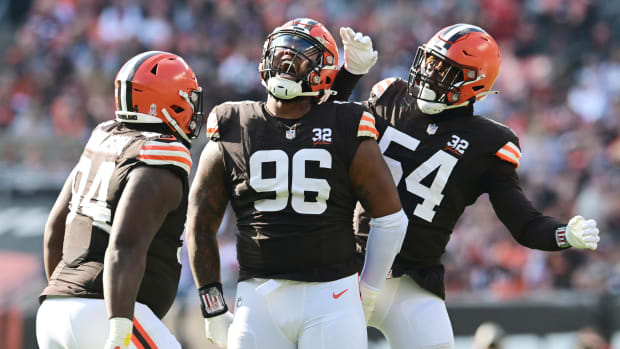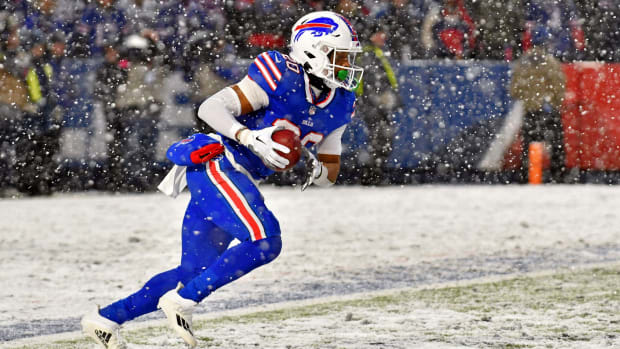Freddie Kitchens Through Six Games
Through six weeks of the season, Cleveland Browns head coach Freddie Kitchens has looked like a first year head coach. Many of the areas he was effective last year as an interim offensive coordinator and play caller have carried over, but now being in the spotlight, some issues have emerged. It seems like some of the good things he does are taken for granted and the warts are being amplified to the point where some are calling for him to lose his job, which is premature. There are areas that must improve, but the good things are worth building on to this point.
One area that has improved, is largely fixed, is the play calling operation. Early in the year, figuring out the process for how they got plays into the game between Kitchens and Todd Monken was inefficient and slow. Baker Mayfield had little time to look at the defense and make any meaningful checks because so much of the time, he was just getting the play off before getting called for delay of game.
The combination of Kitchens and Monken calling plays has been largely positive. There are specific play calls that have been difficult to defend; the infamous 4th-and-9 draw against the Los Angeles Rams as an example. The use of empty formation with a young quarterback and Nick Chubb as the team's best player on offense is particularly frustrating.
Nevertheless, if the Browns would stop killing themselves with mistakes, particularly in the red zone, they'd win and win consistently. Currently, they sit ninth in the league in offensive yards per play (6.0), which is better than last year to this point (5.8). Improved chemistry and just getting into an offensive rhythm will have this increase as it did last year when Kitchens took over and provide the offense so many expected coming into the season.
Kitchens is a great fit for Baker Mayfield and this locker room as a whole. He doesn't try to manage the emotions of his players or his team. He refuses to allow outside forces create issues between players. His human shield approach to press conferences that has him take the blame for everything infuriates members of the media and could ultimately backfire, but the players appreciate it.
His trust in Mayfield and the relationship they have is also positive. He's never afraid to put the ball in the hands of Mayfield, which is exactly how it should be. It has had its share of backfires with this, but the sweat equity built here is important and should pay dividends when Mayfield finds his way past the issues he's dealing with so far this season.
Currently, it's been showing itself in the Browns aggressiveness on fourth down, which has been refreshing. Kitchens has become more willing to bet on his offense on fourth down as the season has progressed. Against the Seattle Seahawks, he found himself in no man's land and went for it on 4th-and-7 with zero hesitation. Win or lose, it was the right call, but when Mayfield hit Jarvis Landry for 27 yards and set up a touchdown, it provided a jolt to the Browns offense. The Browns ultimately lost the game, but he should continue betting on the talent on offense and trusting in the numbers that say teams should be aggressive on fourth down.
As important as the trust in Mayfield has been, Kitchens has at times trusted his players too much. Kitchens will put guys in position to make plays and when it works, it looks great. Breshad Perriman is one good example. Last year, Perriman was added partway through the season and Kitchens saw something he felt could help the offense. He eased him in at first, but utilized more and more, providing some explosive plays and helping the Browns win games.
This year, he was even quicker to pull the trigger on Ricky Seals-Jones, who arrived the week before the season. Seals-Jones has made the most of his opportunities, playing in five games, catching seven passes on 12 targets for 143 yards and a pair of touchdowns.
The flip side is a situation such as putting Antonio Callaway at Z when he's almost exclusively played X and it bit them. Hard. Callaway bobbled a pass that resulted in an interception and completely changed the game against the San Francisco 49ers. Being put in a slightly different spot doesn't excuse the drop and maybe Callaway has been preparing to play Z for weeks, but he didn't look comfortable at all and Kitchens' trust was misplaced, putting the Browns in a hole from which they couldn't recover.
At times, he seems too malleable in terms of making a decision based on the emotion of his players. He seems sympathetic to players making an impassioned plea they can do something and gives them the opportunity to prove it until they burn him. It may prove beneficial in the long run, but it killed their chances in at least one game.
The other area where Kitchens has not been a problem is in terms of game management. His use of timeouts has improved and the challenges are pretty reasonable. In the Seahawks game, Kitchens made a terrible tactical decision going hurry up and limiting his playbook late in the first half trying to score twice before he scored once. On the other hand, in the same game, he didn't hesitate on any of his decisions to go for it on fourth down in that game, which is a notable improvement from the start of the year where he utilized a hard count before punting.
Kitchens has a mentality that is a good fit for where the NFL currently is. He's not afraid to play guys he believes can help him, regardless of how they got to the team and adapt his offense around their strengths. That merit based approach is an easy sell in a locker room and encourages players to work hard.
Kichens is also pretty aggressive on fourth down, which is just plain smart. There are areas where he has to continue to improve, not the least of which is not getting ahead of himself in games, within drives and with trick plays. The bye week is critical for Kitchens and how his team responds and evolves for the remaining ten games will be key to evaluating him as a head coach.




